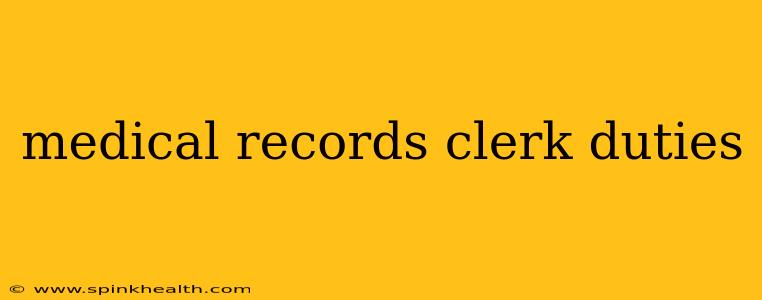A Day in the Life: Unveiling the Crucial Role of a Medical Records Clerk
The bustling atmosphere of a medical facility is a whirlwind of activity, and at the heart of it all, quietly ensuring the smooth flow of patient information, is the medical records clerk. It's a role often overlooked, but undeniably vital to the efficient operation of any healthcare setting. Let's peek behind the curtain and explore the multifaceted duties of this critical position.
Imagine yourself stepping into the shoes of a medical records clerk. Your day begins with a careful review of the schedule, a roadmap to the tasks ahead. This isn't just about filing papers; it's about meticulously managing sensitive patient data, ensuring accuracy, confidentiality, and accessibility.
What are the main duties of a medical records clerk?
This is a question often asked by those considering a career in this field. The answer is multifaceted and involves a blend of organizational skills, attention to detail, and a deep commitment to patient privacy. Key responsibilities frequently include:
-
Maintaining Patient Files: This is the cornerstone of the job. You’ll be responsible for organizing, updating, and storing patient medical records, both physical and electronic. This involves meticulous filing, ensuring every document is in its correct place and readily accessible when needed. Think of yourself as the guardian of the patient's medical history.
-
Data Entry and Management: Accuracy is paramount. You'll input patient data into electronic health record (EHR) systems, ensuring information is up-to-date, complete, and adheres to strict confidentiality protocols. This often involves transcribing information from handwritten notes and other sources.
-
Release of Information (ROI): A critical aspect of the job involves handling requests for patient medical records. This demands a thorough understanding of privacy regulations (like HIPAA) and the procedures for releasing information with proper authorization. You'll be verifying requests, ensuring all necessary permissions are in place before releasing any data.
-
Chart Preparation: Getting patient charts ready for doctor visits or procedures requires careful organization and attention to detail. You’ll be pulling together all relevant medical information, ensuring everything is in place for seamless access by healthcare professionals.
-
Record Retrieval and Archiving: Locating specific records quickly and efficiently is crucial. You'll utilize various indexing and retrieval systems to find the necessary information, whether it’s a physical file or an electronic record. You'll also be involved in the archiving of older records, ensuring they are securely stored and easily retrievable.
-
Maintaining the Records Department: This involves managing supplies, organizing the physical filing system, and ensuring the overall efficiency of the records department.
What skills are needed to be a medical records clerk?
Beyond the technical skills, a successful medical records clerk needs certain soft skills to excel. These include:
- Attention to detail: Mistakes can have serious consequences; precision is non-negotiable.
- Organizational skills: Managing a large volume of files and information requires exceptional organizational abilities.
- Confidentiality: Handling sensitive patient data requires unwavering adherence to privacy regulations.
- Computer skills: Proficiency in using EHR systems and other software is essential.
- Communication skills: Interaction with healthcare professionals and patients requires clear and effective communication.
What software do medical records clerks use?
The software used varies between facilities, but common examples include various EHR systems (Epic, Cerner, Meditech), document management systems, and database software.
What is the difference between a medical records clerk and a medical coder?
While both work with medical information, their roles differ significantly. A medical records clerk focuses on the organization and accessibility of patient records, whereas a medical coder assigns codes to diagnoses and procedures for billing purposes. They are distinct but often complementary roles within a healthcare setting.
How much does a medical records clerk make?
Salaries can vary based on location, experience, and employer. Researching average salaries in your specific area will give you a more accurate picture.
The role of a medical records clerk is far more significant than simply filing paperwork. It's a crucial role that supports the entire healthcare system, ensuring the smooth flow of vital patient information. It's a career that demands attention to detail, a dedication to accuracy, and a deep commitment to patient confidentiality – all while contributing to the efficient and effective delivery of healthcare.

